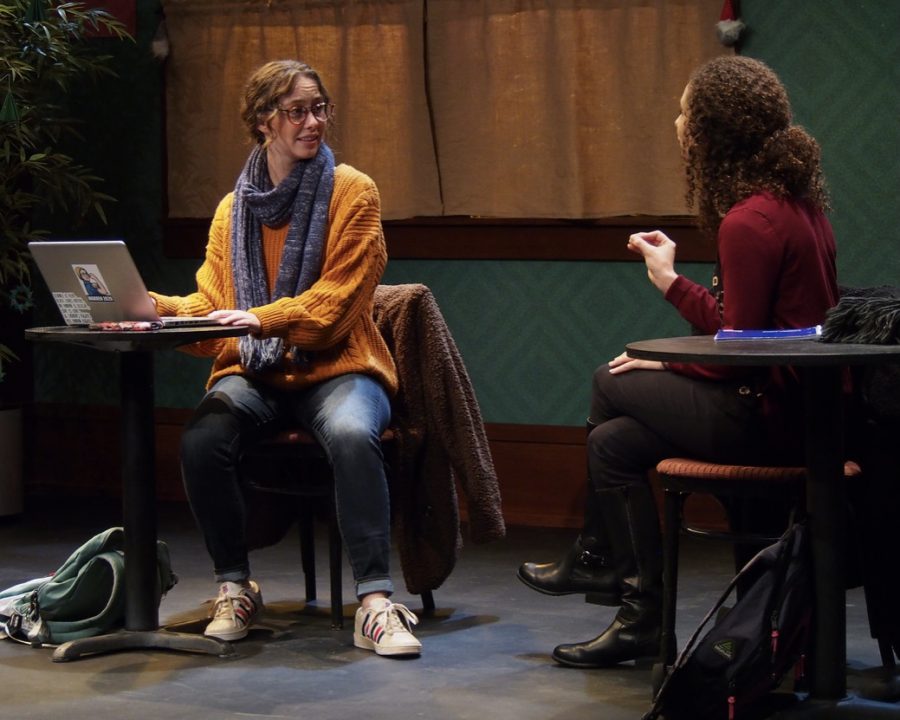Miami approves arts management major
Photo courtesy of Jamie Chmielewski
Arts management student Jamie Chmielewski, left, performs in Miami University’s production of “When We Get Good Again” in 2019.
May 14, 2021
The Miami University Board of Trustees approved the establishment of an arts management major, the first of its kind in the United States, at its Friday, May 14 meeting.
In 2004, Miami established an arts management minor within the College of Creative Arts in collaboration with the Farmer School of Business. The current director of the arts management program, Todd Stuart, came to Miami in 2014 to revise the minor and develop new classes for the co-major that launched in 2016.
A holistic approach to arts and business
Students in the program gain a more holistic education with aspects both in the arts and in business, while still benefiting from Miami’s liberal arts education, Stuart explained.
“I want them to walk away with a strong liberal arts education, which Miami gives, and on top of that what I want to build is an appreciation and deeper passion for the arts and the ability to advocate for the arts,” he said.
The current arts management co-major is built on three pillars: Arts skill set and practice, foundational skill set in arts management, and entrepreneurship and innovation in the arts.
Willie Caldwell, visiting assistant arts management and entrepreneurship professor, credits these pillars in making Miami’s program unique and helping students prepare for a future career in the arts management field.
“Artists can’t just wait around and wait for a job to come to them. They have to create their own work, they have to network, they have to get out there, they have to get as much exposure as possible and really work to identify how their skills can help earn them a source of income,” he said.
Victoria Fanberg, a fellow visiting assistant professor in the program, agrees that the combination of a business and arts education allows students who are involved in the arts to learn a more business-oriented approach to their studies, preparing them for a future career.
“It’s also really valuable for students who are still trying to pursue careers in the arts but giving them that opportunity to learn the business side of things to be successful,” she said.
Students involved in the program, including junior Ryn Bondi, believe that the integrated arts and business approach allows her and her peers to understand both sides of the creative economy.
“There are so many people in the arts that really focus on making the art, but then don’t know how to go about the other side of it so it’s sustainable and can grow and can become something that a lot of people get to see,” said Bondi.
A field with growing opportunities
Stuart said he believes the demand for an academic discipline within the arts management field will make the new likely major program attractive, enhancing Miami’s already unique program.
“I think the major is going to be very popular because it’s an interdisciplinary program, and I know from talking to students and parents too that this intersection of arts and business and entrepreneurship and innovation is appealing,” he said.
According to Miami’s arts management and entrepreneurship webpage, in 2018, arts and culture accounted for 4.2% of the U.S. GDP, and was a $730 billion industry. With growing opportunities in the creative economy, Stuart hopes Miami’s arts management program will see an influx of students with the establishment of the new major.
Right now, the co-major program has a little more than 150 students. Within four years of the major’s establishment, Stuart expects 400 students enrolled across the minor, co-major and major.
Students with shared passions
Bondi and classmate Jamie Chmielewski like that they can connect and build a community with students who have the same passions.
Chmielewski, a May graduate, said she believes the most valuable lessons she learned in her four years happened in Stuart’s class.
“Todd’s big thing is that everything is ambiguous, nothing is as clear as you want it to be,” she said. “(He’s taught us) to embrace ambiguity and embrace not having a rubric.”
The arts management program has also left its mark on the faculty involved. Caldwell mentioned how powerful the arts are and how meaningful it is to teach that to a class of passionate students.
“This program is unlike any other arts management or arts administration program that I’ve ever looked at, ever seen, or ever been a part of,” he said. “The uniqueness and the innovation that’s inherently built into this program I think is just absolutely wonderful.”















